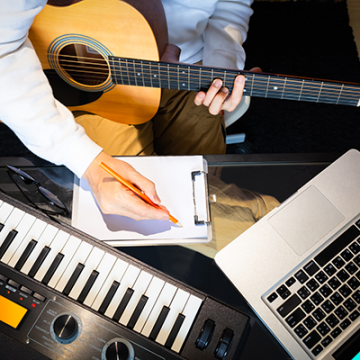

Year 12 Music Repertoire Performance Units 3 and 4
Overview
You will be approaching music performance from a range of angles.
As an instrumentalist, you will be learning to how to practice being a soloist and also as an ensemble musician. You will be exploring a range of musical styles and looking at expressive techniques to recreate repertoire for your instrument.
You will be playing, writing, analysing and listening, with your own instrument (including voice) being the focal point.
There are three main areas: Performing, Analyzing and Responding
In performing, you get a chance to learn various styles of music whilst looking at a range of performance practices and how to interpret works. Using a prescribed list of works, you will choose a selection to be performed at an end of year recital.
You will Analyse music to assist you in your technical and expressive development. This analysis will help you prepare for your recital program.
In Responding to music, you will listen to a wide range of recorded music and look at how the musical elements, and compositional devices work together.
Who is it for?
This subject is for students who enjoy playing notated works from different stylistic backgrounds. It is suggested that you would have been playing your instrument for at least 4 years or that you have learnt music from the AMEB syllabus approximately grade 5 level.
If you have a keen knowledge for developing performance technique and you enjoy responding to music then this is a subject for you to explore.
What do you do?
This course will be delivered by experienced VCE teachers supported by high-quality teaching materials including:
- interactive instructional content
- masterclasses
- online classes
- support from a community of passionate learners from across the state
You will work towards presenting a 20 minute performance which demonstrates a range of notated styles. To do this, you will explore, research and develop your instrumental skills in conjunction with your Instrumental Teacher.
This course will give you the opportunity to experience musicianship skills in a varied way. You will listen to a variety of musicians, extend your musicianship and analyse to develop an appreciation of how musical elements are used in music.
What skills do you need?
- Ability to read music notation is essential
- experience with performing or have completed performance exams (e.g. AMEB or equivalent
- AMEB theory exams or equivalent
- ensemble experience – such as orchestras, choirs, bands, chamber groups.
What skills do you develop?
You will develop:
- research and plan how a recital is prepared and performed
- technical skills on your chosen instrument
- knowledge on how to interpret and manipulate musical elements to suit the stylistic nuance of the repertoire
- listening and analysis skills
- You will develop:
- musical language.
Requirements
- you will need to purchase a text book ‘VCE Aural & Theory Essentials Student Workbook’ by Melinda Ceresoli and Auralia
- access to a suitably qualified Instrumental Teacher: if you do not have access to this because of your regional/remote status, please contact VSV staff, as we may be able to help
- an instrument in good working condition
- access to broadband internet capable of downloading and uploading sizeable video files
- a place to practice
- a video capture device with audio recording is required. This could be an iPhone, video camera or similar
- access to a computer that can edit video and audio, as well as create music notation such as Musescore.
Things to think about
You can look at the prescribed list of works for your instrument on the VCAA website and talk to your instrumental teacher about preparing a recital for the subject.
There is a short end of year exam focussing on responding to music , using music language to notate and recreate.
Things you can do now
Develop a regular practice routine where you set small, achievable goals. Practice short exercises or drills which develop techniques such as:
- tone
- dynamic control
- articulation
- fingering
- listen to professional recordings of your chosen instrument.
Record yourself playing and listen back to identify your strengths and weaknesses.
Go to the VCAA website for more information about this subject.
Things to have a look at
On demand video introducing Music Repertoire Performance
Making Waves 2021 produced by VSV